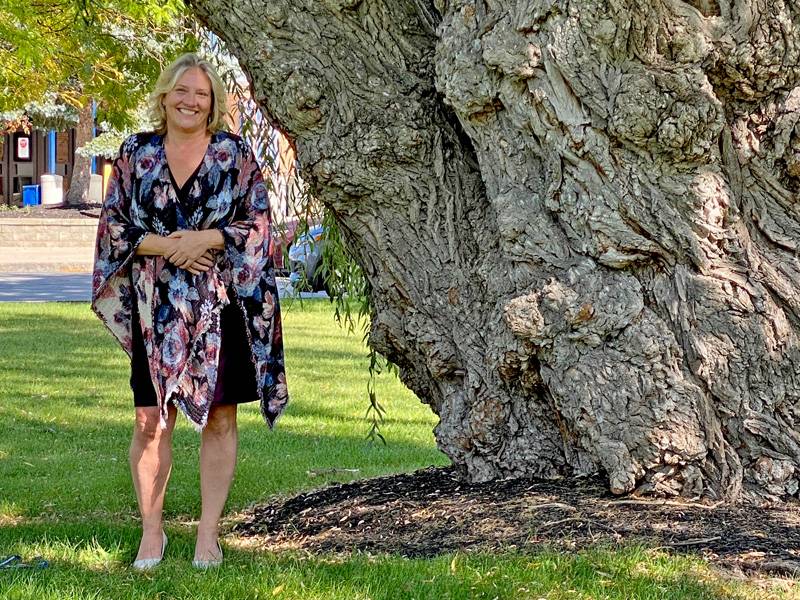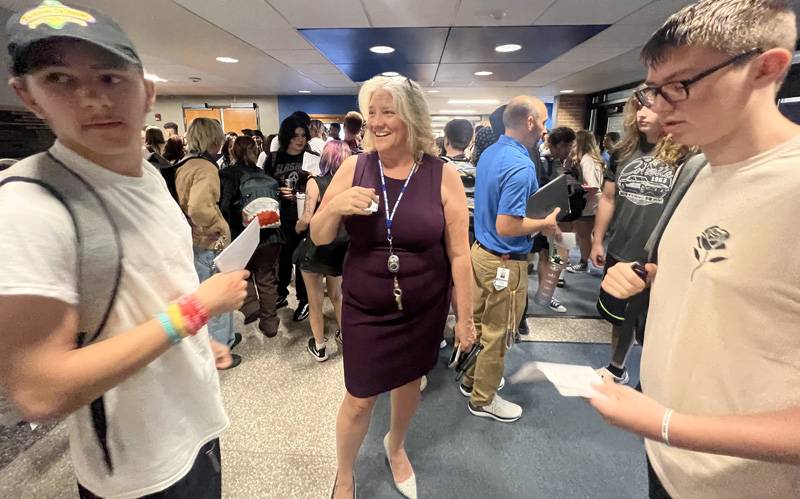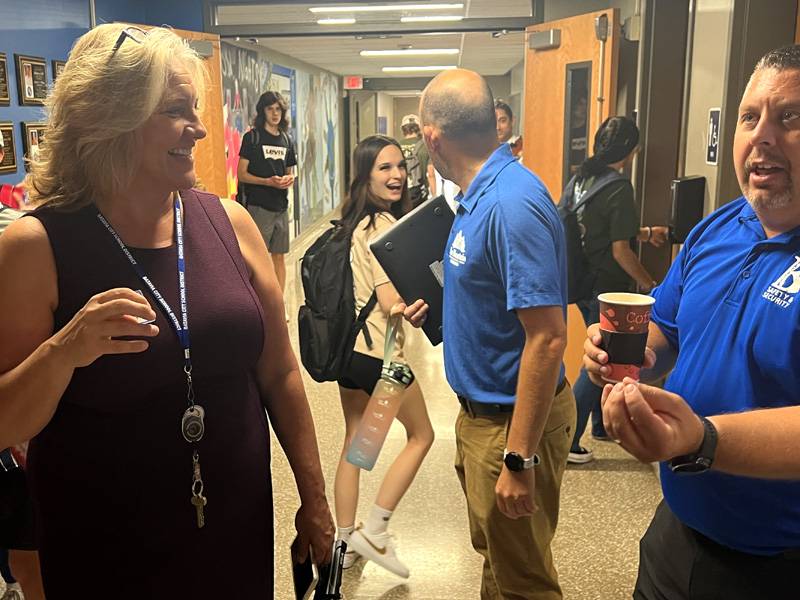Bringing a restorative strength to BHS, new principal wants it to be a place to serve kids' needs

Photo by Joanne Beck.
Restoration seems to be a common thread in Jennifer Wesp’s life, from her work in education to upcycling estate furniture and even giving rescued dogs a new lease on life as the Batavia City Schools administrator has sewn all of those passions together in her personal and professional endeavors.
She’s been easing her way in as the new high school principal, touring the community, meeting people, observing and absorbing her new environment and learning the values of Batavia, she said. While at the same time, she wants to understand the school climate, survey staff, and especially get to know the kids, she said.
“To meet the kids, that was my favorite part. So I'm trying to be very present. I hope that I give that sense of I'm approachable, that I'm warm, that I'm open. I'm trying to be everywhere and responsive,” Wesp said during an interview with The Batavian. “So I feel that kids have been very graceful and kind to me, but it's important to know who they are. So I'm doing things like looking through old yearbooks, trying to make the connections between that beautiful face I see in the hallway and their name, right, because they're not always ready to tell me their name. And I just want them to feel important and connected. So that's a lot of my messaging and the things that I've been doing, you know, one-on-one with them as well as large spaces like class meetings and things like that.”
That may not seem so officially restorative in nature, but Wesp is about getting to know people, “where their baseline is, what they’re really strong at,” which in turn allows her to work with them on “shaping a culture of a building.” After all, what does restorative mean? To be curative, therapeutic, antidotal, healthful and recuperative.
“Because I know it’s a lot, but I think that the most important piece of my job is relationship building, actively listening to the values to be aligned, to make sure that the choices and decisions I’m making as the leader are the decisions that reflect what the community is expecting from the high school, and what the families and the students need from the high school,” she said.
Wesp has a strength in social-emotional learning, she said, which has been a key buzzphrase since COVID.
So what does it mean for her to put a focus on social and emotional elements for kids in school?
“So I think everybody has most mental health needs that we need to attend to every person, right? And I don't know that sometimes our society actually helps us to prioritize that. And then I think after COVID, there were so many different feelings and experiences, and then life just kind of went back to normal, and the new normal doesn't feel the same. So in schools, I think what happened is kids just had a disruption. And there was also probably a lot of fear that was kind of just in their bodies, right? Even if they talked about it or didn't talk about it, because it was a very different experience.” She said. “So I think for schools, we talk about 21st Century skills all the time, which is really like what a kid needs when they leave us. And post-COVID, And not even just COVID, I am honestly just going to say the state of where we are, kids can't learn if their needs aren't being met. So what it looks like in schools now is helping our people who've been trained extensively in academics and trained extensively in those other pieces to also have the tools to meet the kids where they're at. So if they're coming in, and a lot of things are on their plate, they can't just sit down and perform academically.”
The education system has had to make room for some adjustments, she said, such as Mental Health Mondays once a month to take a pause and allow kids the opportunity to engage in some mental health support, social-emotional circles, and breaks from “that academic pressure and be able to build a culture that is connective in their space.”
“So I think it is a buzzword, but I think it's the smaller pieces that we intentionally build in that make the difference with our mental health,” she said.
Five or seven years ago, mental health issues seemed more obvious and visible, she said. Now it’s not always so visible.
“But if you check in with those kids and you have those systems where kids can still have a voice no matter who they are, if they’re the talker, that’s great, they’ll always give you their voice,” she said. “If they’re a quiet kid, what’s our mechanism in school to give them that ability to know that we care, we hear them?”
What do you think is the greatest need of this student population?
“I would say emotional regulation … if they're having a moment where they're frustrated, they're struggling to get to that baseline again. So they kind of use the wrong words; they choose the wrong actions,” she said. “And it's really because their emotions are all over the place. And they haven't learned those skills and those strategies to manage them appropriately.”
How do you help them with that?
“Nowadays, we have all of that stuff that comes in their brains from social-emotional, I mean, from social media, you know, the different things that go on in society now. So I think schools have more of a charge recently to kind of dig into that, how do we teach the kids to manage those situations, because they happen more often,” she said. “And they're coming to school less prepared. And, you know, I don't want to say it's because families don't do their job. I think families try to do an excellent job and meet kids where they can. But I also think a lot of our families are working double, right, they are single families, and maybe they have all of these other pieces on their plates. So in order to meet those needs for their own children, they're battling a bunch of stuff. So I think we have to work in partnership with them.
“And I think we're taking more time to come to the table with kids to make them teachable moments as opposed to, you're just in trouble.”
Aside from all of her academic prowess, Wesp enjoys a good dose of estate sale shopping and working on resin paintings and upcycling furniture at her home in Gates. She also cares for her three rescues: Ringo, a Greater Swiss Mountain dog, a new Pyrenees Newfoundland mix, and Roxxi and Calliope, a pit bull.
She visits her daughter Jade in Chicago a couple of times a year and otherwise sees her here in Western New York and hosts her dad Walter for occasional visits in Batavia, where he lived for some time while living with his grandmother and attending John Kennedy Elementary. Wesp’s son Jacob passed away.
“My son had mental health needs. So as a parent, I wanted to, you know, learn and grow,” she said. “And I wanted to understand, not only from the parent perspective, because I pursued things in that regard to learn my role as a parent, but I also wanted to understand the role of the professionals that he was going to bump into in his school systems, and things like that.”
Wesp pursued teaching, with 15 years working with special education and at-risk youth, and is now in her sixth year as an administrator.
Batavia High School has revised its in-school suspension to offer an alternative to suspension option, and “we’re working to make that a bigger program,” she said.
“So you know, if they were in a fight, we didn't just want them to know they couldn't fight, we wanted them to understand what happens in the real world, like when you're at the mall, and you're mad, and you punch somebody in the face, right? So we have learning around that. Also, those student reflection pieces. So we're in the admin team, in the process of trying to figure out ways to make that a much more robust, restorative program,” she said. “So you're still in an in-school suspension. So you're not really not suspended. What you are that's different is you have teachable, learning pieces that are expected in terms of you living through your consequences. So it's not just you're in trouble. It's that, hey, this wasn't a great choice that you made. But really, this is impacting you. And here's the reasons and the learning we want you to have, so you don't do this again.”
As a first-generation college student who experienced “a lot of bumps in the road” on her own life journey, Wesp has a deep appreciation for education and a love of learning “that was instilled in me from school,” she said.
“I was able to navigate and figure out as a young person that there were systems in place that could help to get me to college and to get me through college. So I think, in general, education has always been in my life for positives and negatives,” she said. “And it's the one-stop shop; everybody has to go to school, and everybody's got to be here for hours and hours and hours on end. So why not make it a place where kids get what they need.”
She hopes to see families during the next open house from 6 to 7:30 p.m. Oct. 5 at the high school.


